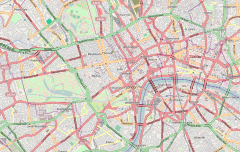The York Buildings Waterworks' Water Tower was a water tower on the north bank of the River Thames and a dominant feature of the 18th century London skyline. It was built by the York Buildings Company, who operated the waterworks there.
| York Buildings Water Tower | |
|---|---|
 Engraving of York Buildings and the Water Tower, c. 1780, by Isaac Taylor | |
| General information | |
| Status | Demolished |
| Type | Water tower |
| Architectural style | Octagonal |
| Address | Villiers Street |
| Town or city | London |
| Country | UK |
| Coordinates | 51°30′28″N 0°07′23″W / 51.507904°N 0.123049°W |
| Completed | Late 17th century |
| Height | 70 feet (21 m) |
| Technical details | |
| Material | Wood |
The water tower was a wooden structure, 70 feet (21 m) high[1] and with an octagonal cross-section. It was erected in the late 17th century on a site at the end of Villiers Street, by the York Watergate, now part of the Victoria Embankment Gardens. The Survey of London includes a drawing (plate 31[2] in volume 18[3]) showing the building.
In art
editThe prominent position and height of the water tower meant it appeared in many paintings and drawings of London's north bank at the time. These include:
| Artist | Title (date) | Gallery/Collection | Notes |
|---|---|---|---|
| John Boydell | Westminster and the York Buildings Waterworks | Palace of Westminster | [4] |
| Canaletto | London Seen Through an Arch of Westminster Bridge (1746–47) | Syon House | [5] |
| Canaletto | London: The Old Horse Guards from St James's Park | Tate Gallery L02305 from The Andrew Lloyd Webber Foundation | [6] |
| Canaletto | "The Thames at Westminster, London" | National Trust, Penrhyn Castle | [7] |
| Joseph Farington | The Old Water Tower at York Buildings, Whitehall | Victoria and Albert Museum | |
| James Peller Malcolm | York Buildings looking towards Westminster with a View of the Water Tower | [8] | |
| James Malton | The River Thames Looking Towards Westminster with York Water Gate and the York Building Water Works (1797) | Tyne & Wear Archives & Museums | [9] |
| William Marlow | The London Riverfront from Westminster to the Adelphi (1971–72) | Museum of London | [10] |
| Samuel Scott | An Arch of Westminster Bridge (c.1750) | Tate Gallery T01193 | [11] |
| Samuel Scott | An Arch of Old Westminster Bridge (c.1750) | Tate Gallery N01223 | [12] |
| After Samuel Scott | A View of the Thames with the York Buildings Water Tower | Tate Gallery N01328 | [13] |
| After Samuel Scott | The Thames with the York Buildings Water Tower | National Museums Liverpool, Walker Art Gallery | [14] |
References
edit- ^ "British Library Collection". British Library. Retrieved 21 September 2013.
- ^ G. H. Gater and E. P. Wheeler (1937). Survey of London: volume 18: St Martin-in-the-Fields II: The Strand. Institute of Historical Research. pp. 19–21. Retrieved 21 September 2013.
- ^ G. H. Gater and E. P. Wheeler (1937). Survey of London: volume 18: St Martin-in-the-Fields II: The Strand Plate 31. Institute of Historical Research. pp. 19–21. Retrieved 21 September 2013.
- ^ "Boydell". Art UK. Retrieved 15 September 2013.
- ^ "Canaletto". WikiPaintings. Retrieved 16 September 2013.
- ^ "L02305". Tate Gallery. Retrieved 15 September 2013.
- ^ "Canaletto". Art UK. Retrieved 16 September 2013.
- ^ "Malcolm". WikiGallery. Retrieved 16 September 2013.
- ^ "Malton". Tyne & Wear Museums. Archived from the original on 16 October 2013. Retrieved 16 September 2013.
- ^ "Marlow". Art UK. Retrieved 15 September 2013.
- ^ "T01193". Tate Gallery. Retrieved 15 September 2013.
- ^ "N01223". Tate Gallery. Retrieved 15 September 2013.
- ^ "N01328". Tate Gallery. Retrieved 15 September 2013.
- ^ "Scott". Art UK. Retrieved 15 September 2013.
